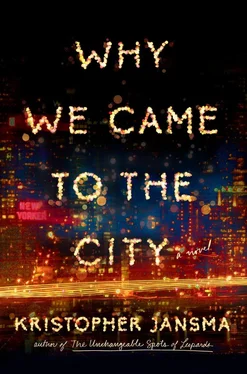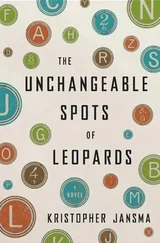She had caught her breath again. She got up and began to walk back across the street, past an idling truck dropping off stacks of the morning’s newspapers. The sky above was just turning to faintest blue. The family who had been there at her birth was now far away, but her other family, her real family, was there inside the warm heart of the city, asleep in an apartment that looked like a catalog page, with the table already set for Thanksgiving dinner.
• • •
Her chest rose and fell as she tried to breathe, but her eyes never opened. Little by little she changed. Her breaths became shorter until they could barely tell if she was breathing at all. It was like seeing a person walking away on a wide city street. Becoming smaller, and finally not disappearing so much as becoming the horizon. In the end none of them could put their finger on the exact moment it happened. But afterward they knew they’d all seen it happen together.
This is just the way of mortals when we die.
Sinews no longer bind the flesh and bones together—
the fire in all its fury burns the body down to ashes
once life slips from the white bones, and the spirit,
rustling, flitters away. . flown like a dream.
— Homer, The Odyssey (trans. Robert Fagles)
Everything takes longer than you expect.
— Murphy’s Second Law
We left the city for good reasons, or at least they seemed good at the time. We had more lives to live and couldn’t spare another hour waiting for the G train. We couldn’t keep paying more and more for the same square inches. We couldn’t keep asking the landlord to fix the same refrigerator. We couldn’t move into a twelfth apartment. We left over bridges and through tunnels, still hoping for our security deposits. Be gone, oboe practicer in the next apartment! Be gone, old couple across the street without curtains or clothes. Anywhere else we could own property. Anywhere else we could own cars! Anywhere else we might be anyone else, or maybe our long lost best selves were only a U-Haul ride away. We lay up at night, wondering, What sorts of people would we be if we were no longer nervous and frayed?
Some of us tried to fight it, desperately ordering more drinks past last call. We divided and subdivided, putting up drywall to turn one bedroom into two. Taking second jobs and thirds. We pushed farther out. Greenpoint was the new Lower East Side, until Bushwick became the new Greenpoint and BedStuy became the new Bushwick. All the people we’d displaced on our way out there looked up to find us coming for them again. When does it end? they asked. We’re sorry, we answered. We don’t know how to stop . Then we looked back over our own shoulders and said, Already?
We spoke knowingly about interest rates. We asked no one in particular what the value of our time was. Anywhere else, it seemed, it would be more. Other cities, other towns promised us benefits, made better offers. We could always come back, couldn’t we? We’d had everything we wanted here, once. Hadn’t we been told that now we’d made it here, we could make it anywhere? Only none of us could say, exactly, what it was we’d made.
So desperate to succeed and in such hasty enterprises! Once we knew someone who worked at the same place for nine years. Another had nine jobs in one year. We dreamed of being fired. Let us go! we cried. There were so many things that we would do differently next time. We began to hurt each other and insult everyone else. Black clouds moved with us wherever we went, and friends recommended a new yoga studio, less gluten, window-box gardening. Doctors prescribed things to help us sleep, smile, function. We were afraid to go on vacation because we didn’t know if we could take coming back.
It was time. Time when our bartender knew our turtles’ names. Time when a girl on Franklin Avenue threw up kale tacos on our shoes. Time when a panel of tin fell from the bar ceiling and smashed our pitcher of Negronis. Time when we recognized the opening act’s lead guitarist from where he panhandled by the Met Foods. Time when that eighteenth stroller pinned us in at brunch and refused to let us out. They were finding bloody sheep’s heads in the park. In Midtown there was a place where a burger cost twenty-nine dollars. Now we knew our flood zones. Our boss had joined CrossFit. There was another new old museum and another new Disney musical and another convention for home picklers. The L train wouldn’t be running for the next nine weekends. The price of a MetroCard was going up again. We hardly noticed, and that scared us more than anything.
It was remarkable how easily and insensibly we’d fallen into routines, beating the same track from apartment door to office elevator, stopping midway only for the same pain au chocolat and coffee and the same café with an ever-rotating staff. For lunch there were the same endless salad bars and armies of chilled sandwiches. Now we ordered our dinners with the click of a button. The same button, the same dinners. No need to speak to anyone. The bars were the same, the drinks were the same, even the new ones (especially the new ones), and afterward we took cabs home and didn’t even look out the window.
There were parts of the city we hadn’t seen in years. They reminded us of people who had left us, and we excised them from our maps before they could spread. It’s not the same , we said, it’s just not the same. It’s not like it was, before . We never said before what, but it was understood. We resented those who left almost as much as we hated those who stayed, because they weren’t enough. Like old wood, we splintered apart at the slightest touch until we were nothing but slivers stuck in each other’s fingertips.
How worn and dusty were the places we had been holding on to. Deep in the ruts where everything settled. We wanted to rise up and out. See the moonlight amid the mountains. Breathe dry air and drink soft water. We began to build our castles in the air, hoping sooner or later they’d carry us off. New days came like clockwork without becoming tomorrows. We slept less and less, dipped in darkness through the daytime and heated by burning light in the endless evening. And only when we finally got up, threw on our clothes and walked away, did we realize that we had all been gone for years already.
JANUARY
During his first year working at Anchorage House, Jacob had stepped off the bus each day in front of Winston, the daytime guard, with satisfaction. While others rode on to their frictionless white office towers, he had but to give Winston a quick sarcastic salute to make the imposing wrought-iron gates creak open. Up and up the gravel driveway he’d climbed, past semicollapsed stables and yawning gray oaks. In a former life it had been a convent to the Bonnes Sœurs de la Grande Miséricorde with a giant statue of Jesus on the front lawn. Now it was a 125-bed private psychiatric facility accepting Blue Cross/Blue Shield, United Healthcare, and Medicaid, for adolescents who were persistently suffering from a host of mental ailments or required rapid stabilization in a “secure twenty-four-hour therapeutic sphere.” Jesus had been hauled around to the back, near where the nuns were still buried.
That first year Jacob had come in early just to spend an hour outside under the big willow tree by the duck pond, feeling like Keats, gazing up at the haunted spires and the patched, leaky roofs that were home to hunchbacks and gargoyles of his mind. At night he’d ducked out during moonless evening shifts and paced the snowy graveyard that still claimed the bodies of three dozen Wives of Christ, his heart stinging in his ribcage as the shadows whispered poems in his freezing ears.
Читать дальше












